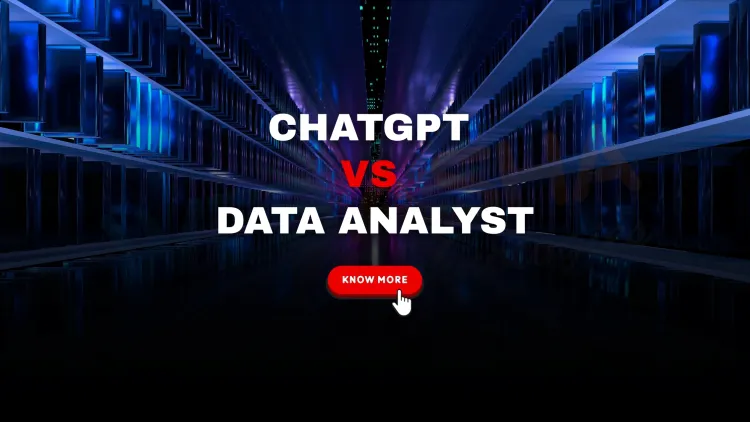Can ChatGPT Write Better SQL Than a Data Analyst? Complete Comparison with Real Examples
Wondering if ChatGPT can write SQL better than human analysts? This detailed comparison explores how ChatGPT performs in SQL generation, its accuracy, speed, real-world limitations, and where data analysts still have the upper hand. Discover when to trust AI and when human context wins.

Table of Contents
- What Is SQL and Why Is It Crucial?
- How ChatGPT Generates SQL
- How Human Analysts Write SQL
- Comparison Table: ChatGPT vs. Data Analyst in SQL Writing
- Real-World Scenario Test
- Limitations of ChatGPT in SQL Generation
- Where ChatGPT Shines
- Expert Opinions
- Best Practice: Combine ChatGPT + Analyst
- Security and Privacy Consideration
- Conclusion
- Frequently Asked Questions (FAQs)
With the rapid rise of AI-powered tools, many professionals are asking a crucial question: Can ChatGPT outperform a human data analyst in writing SQL queries? It’s a debate that blends machine learning, natural language processing, and the daily realities of data analytics workflows.
In this blog, we’ll compare how ChatGPT handles SQL generation versus traditional methods used by human analysts — focusing on accuracy, speed, flexibility, context awareness, and limitations.
What Is SQL and Why Is It Crucial?
SQL (Structured Query Language) is the foundation of data extraction in relational databases. It's how analysts:
-
Pull records from tables
-
Join multiple datasets
-
Perform aggregations (SUM, AVG, COUNT)
-
Filter and transform raw data into insights
Every data-driven organization relies heavily on SQL, whether for reporting, product decisions, marketing analytics, or customer segmentation.
How ChatGPT Generates SQL
ChatGPT can translate plain English instructions into fully structured SQL statements. It supports:
-
SELECT,JOIN,WHERE,GROUP BY,ORDER BY -
Window functions
-
Subqueries and nested logic
-
Common Table Expressions (CTEs)
-
SQL dialects (MySQL, PostgreSQL, SQL Server, SQLite)
Example:
Prompt to ChatGPT:
“Show me the top 5 products by revenue in 2024, grouped by category.”
Generated SQL:
SELECT category, product_name, SUM(revenue) AS total_revenue
FROM sales_data
WHERE YEAR(sale_date) = 2024
GROUP BY category, product_name
ORDER BY total_revenue DESC
LIMIT 5;
How Human Analysts Write SQL
A data analyst doesn't just write queries — they:
-
Understand business logic
-
Know database schema intimately
-
Account for edge cases
-
Optimize queries for performance
-
Validate results with domain knowledge
Analysts may iterate on a query several times, ensuring it answers the exact business question while aligning with context.
Comparison Table: ChatGPT vs. Data Analyst in SQL Writing
| Feature/Aspect | ChatGPT | Human Data Analyst |
|---|---|---|
| Speed | Extremely fast | Slower but deliberate |
| Accuracy (basic queries) | High in structured prompts | High |
| Context understanding | Limited to prompt | Deep, based on company and data knowledge |
| Optimization | Basic to moderate | Advanced indexing, joins, etc. |
| Error handling | May guess or hallucinate | Data-validated |
| Data sensitivity | Doesn’t see actual data | Works directly with datasets |
| Creative joins/logic | Struggles with complex logic | Strong in custom logic & exceptions |
| Learning curve | Minimal for prompt crafting | Years of SQL experience |
Real-World Scenario Test
Let’s test ChatGPT and a human analyst on the same prompt.
Task:
“Find the average order value per customer who has placed more than 5 orders in the last year.”
ChatGPT Output:
SELECT customer_id, AVG(order_total) AS avg_order_value
FROM orders
WHERE order_date >= DATE_SUB(CURDATE(), INTERVAL 1 YEAR)
GROUP BY customer_id
HAVING COUNT(order_id) > 5;
✅ ChatGPT provided a correct and efficient query.
Human Analyst's Thought Process:
-
Might add additional filters (e.g., exclude test users)
-
Check for NULLs or zero order values
-
Confirm customer table join if needed
Both approaches are valid, but the human analyst adds business logic awareness ChatGPT doesn’t have by default.
Limitations of ChatGPT in SQL Generation
-
No access to actual data
-
Can’t validate output unless sample schema and data are provided.
-
-
Context-blind
-
Doesn't know specific field names unless told.
-
-
Schema sensitivity
-
May guess column/table names incorrectly.
-
-
Edge cases and data anomalies
-
Can miss rare or unexpected data behavior.
-
-
Performance blind
-
Doesn’t optimize queries for database efficiency or cost.
-
✅ Where ChatGPT Shines
-
Speeding up repetitive tasks
-
Helping non-technical users write basic queries
-
Providing SQL templates for learning or prototyping
-
Improving onboarding speed for junior analysts
-
Generating SQL for test databases or assignments
Expert Opinions
-
“AI can write good SQL, but great SQL requires business understanding.” — Senior Analyst at a Fortune 500 firm.
-
“ChatGPT is like a super-fast intern. It helps, but you still need someone senior to guide it.” — Data Science Manager.
Best Practice: Combine ChatGPT + Analyst
Rather than a replacement, ChatGPT should be seen as a powerful assistant:
-
Analysts can use it to speed up first drafts.
-
It helps generate boilerplate or exploratory queries.
-
It allows cross-validation of logic and structure.
Security and Privacy Consideration
If using real data:
-
Never input confidential schema or records into public tools.
-
Use sandboxed environments or local instances of ChatGPT (if enterprise-secured).
Final Thoughts
So, can ChatGPT write better SQL than a data analyst?
The answer is — it depends.
ChatGPT excels at speed and syntax but lacks the real-world context, optimization expertise, and validation mindset that experienced analysts bring. It’s a fantastic tool for assistance and prototyping, but human analysts remain essential for precision, accuracy, and understanding business logic.
For the best results, use both. Think of ChatGPT as your smart SQL co-pilot — not the pilot.
FAQ
Can ChatGPT write SQL queries?
Yes, ChatGPT can generate SQL queries from natural language prompts across various SQL dialects.
Is ChatGPT accurate when writing SQL?
It’s accurate for general queries, but it can make mistakes if the database schema or logic isn't clearly provided.
Can ChatGPT replace data analysts for SQL tasks?
No, ChatGPT lacks business context, validation, and optimization that analysts provide.
How does ChatGPT compare to a human in SQL writing?
ChatGPT is faster for simple tasks but less reliable for complex, context-heavy SQL queries.
Can ChatGPT optimize SQL queries for performance?
No, it doesn’t analyze indexes, database structure, or query execution plans.
Does ChatGPT know SQL syntax?
Yes, it knows the syntax of various SQL types like MySQL, PostgreSQL, SQLite, and SQL Server.
Can ChatGPT connect to databases directly?
Not in public versions. It doesn’t run queries; it only generates code.
How do I get the best SQL from ChatGPT?
Provide a clear prompt with table names, column names, and desired output.
Can ChatGPT write JOIN queries?
Yes, it can write INNER JOIN, LEFT JOIN, and complex multi-table joins.
Is ChatGPT useful for learning SQL?
Absolutely. It helps beginners understand structure, syntax, and use cases.
Can ChatGPT write subqueries and CTEs?
Yes, it can generate subqueries and Common Table Expressions.
Does ChatGPT support SQL window functions?
Yes, it can generate queries using RANK(), ROW_NUMBER(), and other window functions.
Is it safe to input schema into ChatGPT?
Avoid sharing sensitive or proprietary data. Use anonymized schemas when possible.
How can analysts benefit from ChatGPT?
It accelerates query drafting, debugging, and documentation creation.
Can ChatGPT generate SQL for big data systems?
It can write SQL for platforms like BigQuery or Hive, but without optimization.
Does ChatGPT write accurate queries every time?
No, it may make logical errors or incorrect assumptions if the prompt is vague.
Can ChatGPT generate queries from business questions?
Yes, if the question is clear and schema details are provided.
Is ChatGPT good for prototyping SQL?
Yes, it helps rapidly generate initial queries to test and refine.
Can ChatGPT understand complex business rules?
Not inherently. You must explicitly define business logic in the prompt.
How fast is ChatGPT at writing SQL compared to a human?
It’s much faster, generating queries in seconds, but may lack context accuracy.
Can ChatGPT help debug SQL queries?
Yes, if you paste the query and error message, it can often suggest fixes.
What limitations does ChatGPT have with SQL?
It can hallucinate, assume incorrect schema, and lacks data validation capabilities.
Can ChatGPT help junior analysts with SQL?
Yes, it’s a great learning assistant and productivity booster.
Should companies rely solely on ChatGPT for SQL?
No, human oversight is essential to ensure correctness and data integrity.
Can ChatGPT identify indexes or performance issues?
No, it cannot inspect databases or analyze performance bottlenecks.
How do I test ChatGPT’s SQL output?
Run it in a sandbox or test environment to verify correctness.
Is ChatGPT better than AI-based BI tools?
It complements BI tools but isn’t a replacement for real-time, integrated data solutions.
Can I use ChatGPT with my company’s database?
Only if you build a secure, private integration — public versions are not suitable for internal data.
Will ChatGPT replace SQL developers?
It may automate routine tasks but not strategic, optimized, or secure development work.
Can ChatGPT generate SQL for reporting dashboards?
Yes, it can generate SQL for chart-ready datasets, assuming clear instructions.












![Top 10 Ethical Hackers in the World [2025]](https://www.webasha.com/blog/uploads/images/202408/image_100x75_66c2f983c207b.webp)


![[2025] Top 100+ VAPT Interview Questions and Answers](https://www.webasha.com/blog/uploads/images/image_100x75_6512b1e4b64f7.jpg)







